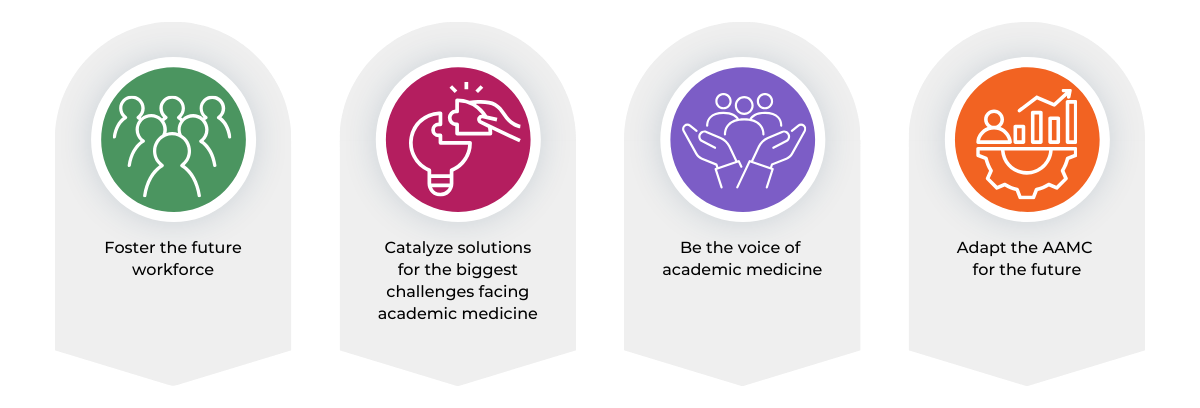A Healthier Future for All: The AAMC Strategic Plan
About the AAMC Strategic Plan
The AAMC’s strategic plan addresses the rapidly changing landscape of medical education, health care, medical research, and community collaborations. Developed in 2019-2020 at the start of the tenure of President and CEO David J. Skorton, MD, it continues to be shaped by extensive input from the academic medicine community. This multiyear plan advances bold initiatives designed to tackle today’s most pressing challenges and act on opportunities affecting patients, communities, health care, and academic medicine.
Today’s environment for health care, medical education, and research is as complex as ever. Yet these challenges only steel our resolve to drive transformative change and highlight the profound impact of the lifesaving and life-changing work happening at academic health systems and medical schools. By leading, serving, and advocating for academic medicine, we remain steadfast in our pursuit of better health for people everywhere.
The strategic plan creates opportunities to enhance learning, discovery, health care, and community collaborations in a dynamic and evolving world.
A Healthier Future for All
Systemic change requires systemic action. That’s why, with the support of our members and a community of experts, the AAMC’s strategic plan is structured around four key impact areas.

Foster the future workforce
Whether a learner is beginning to explore a career in medicine, applying to medical school, pursuing their MD degree, or preparing for residency, the AAMC supports them every step of the way.
The AAMC’s strategic plan focuses on attracting and advancing a talented physician workforce by inspiring and preparing students from an early age to pursue careers in medicine, health sciences, and biomedical research. The association is committed to ensuring the next generation reflects the full spectrum of backgrounds, experiences, and perspectives needed in today’s complex and interconnected society.
The plan is building an integrated system of knowledge, guidance, and support that empowers future physicians to explore their options, make confident decisions, and focus on serving patients and communities.
As a leader in developing and delivering solutions across the medical education continuum and in supporting the broader field of academic medicine, the AAMC serves as a trusted partner to institutions and specialties in guiding the future physician workforce from inspiration to practice.
Learn more about the AAMC’s summer enrichment programs, flexible admissions models, data and reports to support a thriving biomedical research workforce, strategies to support learners, and our communitywide collaborations to improve the transition to residency.
Catalyze solutions for the biggest challenges facing academic medicine
For 150 years, the AAMC has been at the forefront of innovation and transformation in medical education and health care.
In medical education, the AAMC works to ensure that medical students acquire the skills and knowledge needed to meet the needs of their patients, emphasizing competency over time-based training — an important focus within our strategic plan.
Learn more about competency-based medical education and the foundational competencies in medical education.
In health care delivery, the AAMC supports the unique environment of academic health systems — where top-tier medical expertise intersects with cutting-edge research — making them essential for training the next generation of physicians and health care professionals. As part of the strategic plan, the AAMC has advanced the adoption of integrated behavioral care in both primary and specialty care and continues to explore how technology can enhance these models of care.
The AAMC is committed to a culture of excellence in medical schools and academic health systems where every member of the academic medicine community can thrive, through innovations like Restorative Practices in Academic Medicine, which promote collaboration, well-being, and professional growth.
Be the voice of academic medicine
The AAMC educates policymakers and influencers about, advocates for key priorities, and advances policies that strengthen the nation’s health and well-being — work guided in the strategic plan. It also elevates the voice of academic medicine and communicates its value to the broader community.
These efforts are essential for sustaining and expanding critical funding that supports the vitality of the nation’s medical schools and academic health systems, ultimately improving the health of all. Through this work, the AAMC helps to shape legislation and policies that affect health care delivery, research, education, equitable access to care, and more.
Adapt the AAMC to the changing needs of academic medicine
As academic medicine and health care undergo rapid transformation, the AAMC must evolve alongside them. Changes in operations and structures across academic medicine call for the association to continually reassess our strategies, programs, and opportunities for member engagement.
Through the strategic plan, the AAMC is carefully evaluating how to expand and deepen its impact — working to advance its vision of a healthier future through learning, discovery, health care, and community collaborations.